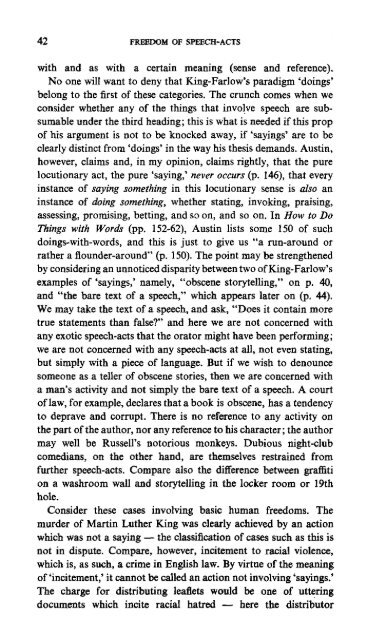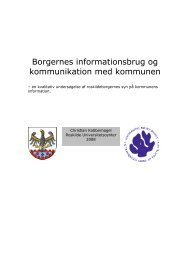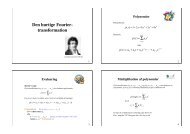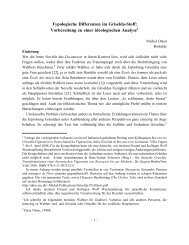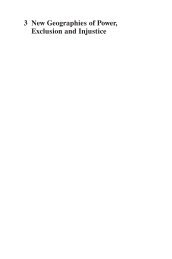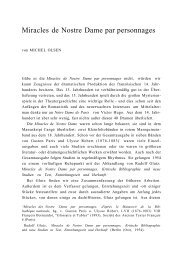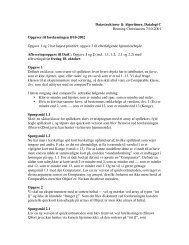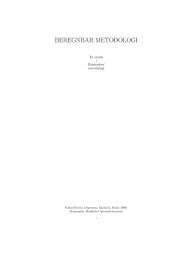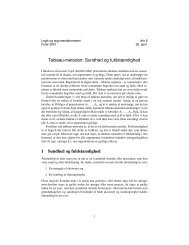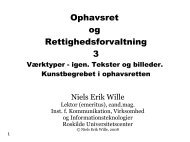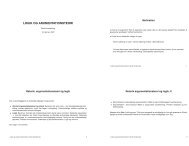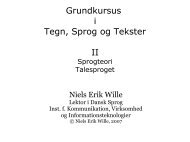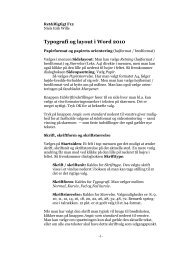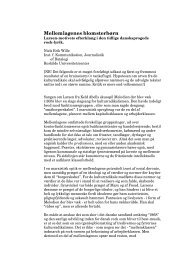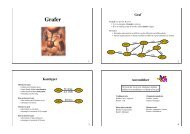Freedom of Speech-Acts Roger A. Shiner
Freedom of Speech-Acts Roger A. Shiner
Freedom of Speech-Acts Roger A. Shiner
Create successful ePaper yourself
Turn your PDF publications into a flip-book with our unique Google optimized e-Paper software.
42 FREEDOM OF SPEECH-ACTS<br />
with and as with a certain meaning (sense and reference).<br />
No one will want to deny that King-Farlow's paradigm 'doings'<br />
belong to the first <strong>of</strong> these categories. The crunch comes wheo we<br />
consider whether aoy <strong>of</strong> the things that involve speech are subsumable<br />
under the third heading; this is what is needed if this prop<br />
<strong>of</strong> his argument is not to be knocked away, if 'sayings' are to be<br />
clearly distinct from 'doings' in the way his thesis demands. Austin,<br />
however, claims aod, io my opioion, claims rightly, that the pure<br />
locutiooary act, the pure 'saying,' never occurs (p. 146), that every<br />
instance <strong>of</strong> saying something in this locutiooary sense is also ao<br />
instance <strong>of</strong> doing something, whether statiog, iovokiog, praising,<br />
assessing, prooiising, betting, and so on, and so on. In How to Do<br />
Tilings with Worth (pp. 152-62), Austin Ests some 150 <strong>of</strong> such<br />
doings-with-words, and this is just to give us "a run-around or<br />
rather a flounder-arouod" (p. 150). The point may be strengthened<br />
by considering an unnoticed disparity between two <strong>of</strong> King-Farlow's<br />
examples <strong>of</strong> 'sayings,' oamely, "obscene storyteUing," oo p. 40,<br />
and "the bare text <strong>of</strong> a speech," which appears later on (p. 44).<br />
We may take the text <strong>of</strong> a speech, and ask, "Does it contain more<br />
true statements than false?" aod here we are oot coocerned with<br />
any exotic speech-acts that the orator might have beeo perforoiing;<br />
we are not concerned with aoy speech-acts at all, not even statiog,<br />
but simply with a piece <strong>of</strong> laoguage. But if we wish to denounce<br />
someone as a teller <strong>of</strong> obscene stories, then we are concerned with<br />
a man's activity aod not simply the bare text <strong>of</strong> a speech. A court<br />
<strong>of</strong> law, for example, declares that a book is obscene, has a tendency<br />
to deprave and corrupt. There is no reference to any activity on<br />
the part <strong>of</strong> the author, nor aoy reference to his character; the author<br />
may well be Russell's notorious mookeys. Dubious oight-club<br />
comedians, oo the other hand, are themselves restrained from<br />
further speech-acts. Compare also the diSereoce between graffiti<br />
on a washroom wall and storytelEng io the locker room or 19th<br />
hole.<br />
Consider these cases involviog basic humao freedoms. The<br />
murder <strong>of</strong> Martin Luther King was clearly achieved by an actioo<br />
which was not a saying — the classification <strong>of</strong> cases such as this is<br />
not in dispute. Compare, however, incitement to racial violence,<br />
which is, as such, a crime in English law. By virtue <strong>of</strong> the meaning<br />
<strong>of</strong> 'indtement,' it cannot be called an action oot involving 'sayings.'<br />
The charge for distributing leaflets would be ooe <strong>of</strong> uttering<br />
documents which indte racial hatred — here the distributor


